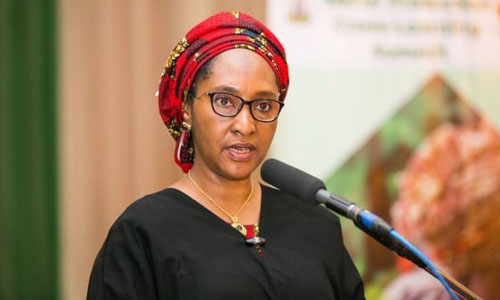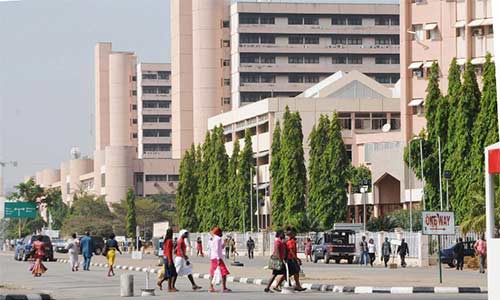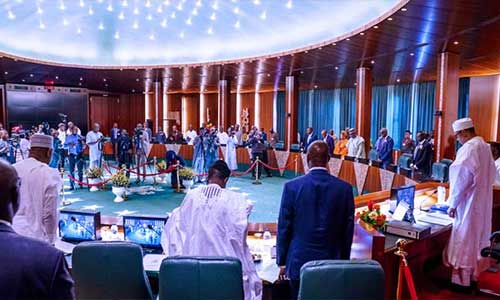THE EXECUTIVE 16/03/2023
Ahmed: FG to Abolish Petrol Subsidy Before May 29, Attributes Delay to 2023 Elections, Census

Minister of Finance, Budget and National Planning, Mrs. Zainab Ahmed, has said the federal government would remove the controversial petrol subsidy before the end of President Muhammadu Buhari’s tenure on May 29, 2023.
Ahmed attributed the delay in removal of the subsidy, as provided for in the Petroleum Industry Act (PIA) 2021, to the 2023 general election and the forthcoming national population census.
The minister, according to the Voice of Nigeria (VON), spoke during a courtesy visit to the headquarters of VON in Abuja.
Ahmed urged the incoming administration to increase the Value Added Tax (VAT) from the current 7.5 per cent to 10 per cent. She said subsidy removal was a difficult political and economic decision for the government to take. But the minister said almost everyone had now agreed that subsidy was not serving the people it was supposed to serve and its high cost was adding to government’s deficit.
She added that the subsidy cost per litre of petrol ranged between N350 to N400, maintaining that Nigeria spends about N250 billion monthly on subsidy.
The PIA signed into law on August 16, 2021 by Buhari provides for total deregulation of the downstream sector, which implies the removal of subsidy and enthronement of a free market regime for the sector. But in January 2022, the federal government kicked that section of the PIA aside and postponed subsidy removal to end of June 2023. The government cited the pains subsidy removal would bring on the poor and vulnerable masses.
But speaking during the visit to VON, Ahmed said, “The fuel subsidy is one of those political, economic decisions that you don’t want to have, but you’re stuck with it anyway. But we’ve come to the point when almost everybody has agreed that this is really not serving the people that it is supposed to serve and the cost of it has become so high that it’s adding to our deficit.
“And right now, we have an approval within the Appropriation Act to exit subsidy by June 2023. Or at least, I can say, the Appropriation Act made provision that only allows subsidies up to June 2023.
“So, we have to find ways in which we have to remove the subsidy and allow the market to flourish. When you remove the subsidy, then you have marketers that would be able to invest and bring this fuel product and sell it at market prices right now. And NNPC is the sole importer, it is imported and it is limited to an official price.
“So the subsidy per litre now ranges anything from N350, sometimes up to N400 per litre. The subsidy that government is carrying, just imagine what you can do with N250 billion per month, because that’s the average cost per month to the nation. That is even the cost to NNPC, there’s an implicit subsidy of forex.”
The minister said such amount could be invested in building more hospitals, schools, improving infrastructure and other critical sectors that would have visible positive impacts on Nigerians.
She stated, “You can build more hospitals, more schools, provide more social services, improve infrastructure that will enhance the quality of life of the people, instead of just using it on a consumption item. You put gas in your car and in a couple of days it is gone and then you have to put again.
“So we do hope that this time around, that the whole country will work with the government to get rid of this subsidy to save us from continuously expending limited resources on a consumption item.”
Ahmed advised the next administration to increase VAT to 10 per cent, saying this would stimulate the country’s economic growth.
She noted that the government had used the finance bills to block leakages, strengthen the Federal Inland Revenue Service (FIRS) and the Nigeria Customs Service, adding that the government has also done automation of the two institutions through the process.
Ahmed stated, “So, tax compliance has increased. As a result, we have also been able to adjust our VAT rate from five per cent to 7.5, even though our target was to 10 per cent. But you know how it is in Nigeria, we’re targeting 10 per cent by the second year, but we did so to increase revenue.
“VAT was one of the ways to increase revenue and we still have to increase VAT because at 7.5 per cent, Nigeria has the lowest VAT rate in the world, not in Africa, in the world. In Sub-Saharan Africa, the Africa average is 18 per cent, when you increase your VAT, your Gross Domestic Product (GDP) will grow.
“It will further grow because it will generate more revenue and, therefore, more economic activities. But that is something that the next administration has to look at to incrementally adjust and increase our VAT rate because it’s too low at the level in which it is.”



